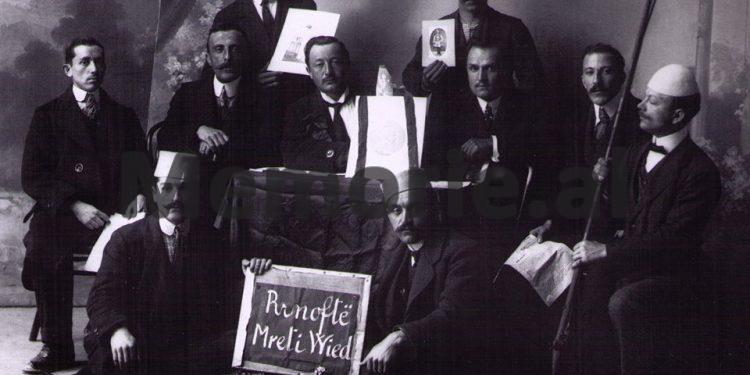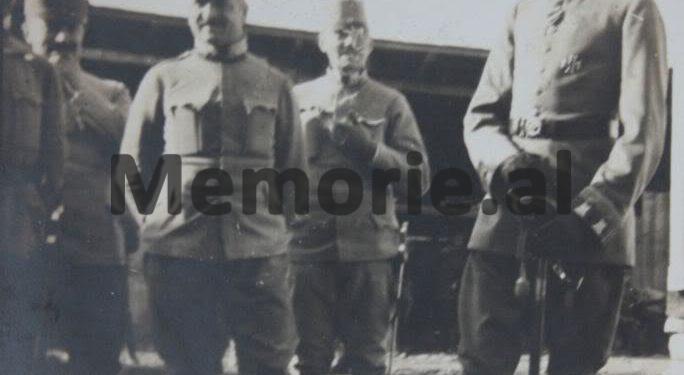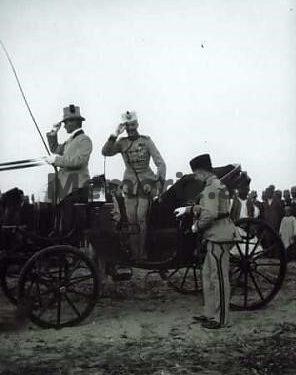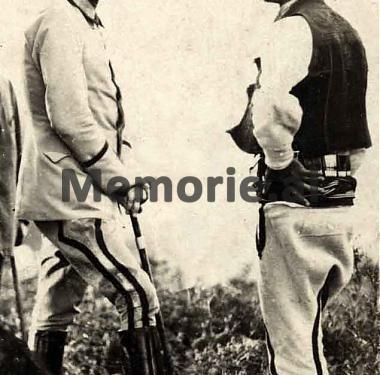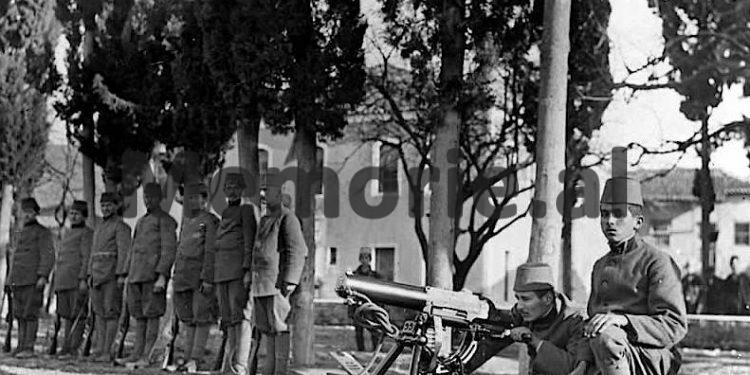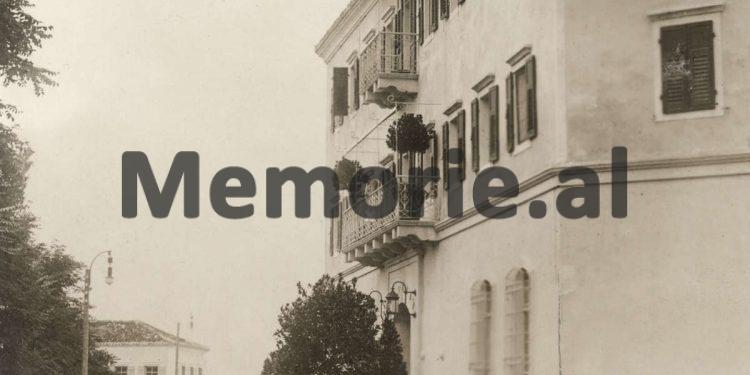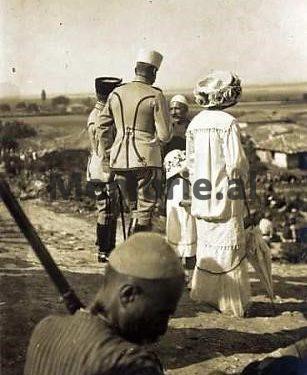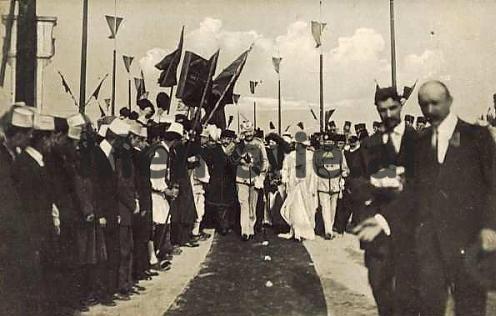Dashnor Kaloçi
Memorie.al publishes some excerpts from the unknown memoir entitled “Denkeschrift uber Albanian” (Memorandum on Albania), written by Prince Wilhelm Wied and published in Germany immediately after the First World War, where the German prince who reigned only six months in the small Balkan country, in a special chapter he wrote a political-economic program for Albania, where he presented his ideas that he thought to implement during his reign. All the ideas of the German prince written in his political-economic program, through which he thought that Albania would develop and prosper, published for the first time in that book that was translated by the Institute of History in Tirana in 1956, (but who never saw the light of day), where Wilhelm Wied, among other things, has long dealt with the history of Kosovo, presenting facts and documents, even demanding that it be returned to the mother trunk , Albania, as it was an injustice to the small Balkan country on the Adriatic, that the Great Powers, at the London Conference, for political conjuncture severed almost half of its territory.
In his memoir entitled “Denkeschrift uber Albanian” (Memorandum on Albania), which was originally published in Germany immediately after the First World War, the German Prince, Wilhelm Wied (1876-1945) has published a chapter of long, where he presented an economic-political program, which he had made ready to implement in Albania, in the small Balkan country where he reigned for only six months. A special place in that program is occupied by Kosovo and other Albanian areas unjustly left outside its natural borders by the London Conference in 1913, for which Wied sought to return immediately to Albania. That request, Prince Wilhelm Wied, did not present it simply as a wish of his, but he argued it with facts and documents, writing that it was a legitimate right of the small Balkan country on the Adriatic, which, the Powers the Great, for instant political conjunctures and to satisfy the ‘appetites’ of the neighbors, unjustly severed almost half of the territories of its trunk. In this regard, from Wied’s memoirs originally published in his book “Denkeschrift uber Albanian” (Memorandum on Albania), a book which in 1956 was translated by the Institute of History in Tirana, (if you did not see it never published), Memorie.al has selected only a few parts of it, where he talks about the political-economic program, where the German prince, Wilhelm Wied, has presented his ideas, how it would progress and develop Albania.
Continues from the last number
Prince Wid’s political-economic program for Albania
The industry of Albania, with the exception of some mills, which are technically located at a very low level, does not exist. But the prospects for the development of a rich industrial life are quite favorable and very promising given the vast land resources and natural intelligence of its inhabitants. Although a serious excavation of Albania’s land resources to date has not found a place, it is still clear today, not only from the stories of the ancient Romans about the Roman gold and silver mines, but also from the discovery that was made recently discovered chromium, mercury, copper and metals of iron, kerosene, greenhouse, etc., that Albania in a close special examination, is a country rich in toxic mineral resources.
Reports on the discovery of rich iron and coal deposits are confirmed, then the prospects for a strong industrial development are further increased. Both the traffic and the industrial development of the country will be greatly supported by the electric power, which will be mass-produced by the water power. In terms of trade and industry, the magnificent forests of oak, oak, beech, and fir cover the mountains inland. The exploitation of these vast forests in the interior of the country will give after the establishment of suitable road connections, good income. The wood of the country, which is found in southern Albania in the majority, forms now an export item to be noted. One of the main responsibilities of the future will be to bring good schools to life.
To avoid internal religious strife, it should not be tolerated for schools to become hotbeds of political or confessional agitation, as has often been the case in the past. On the contrary, they should educate the Albanian youth in positive work and especially in national feelings. Only national feelings make a single people strong. The language of instruction should be Albanian. German and Turkish could be taught in the upper grades; German for reasons of necessary cultural and political support to Germany and Austria-Hungary; Turkish, because of such old traditional relations, but also because of economic ties with the Orient, which generally go through Turkish land.
“The problem of religions, solved”
In terms of religious issues, Albania will be a place where all religions will be respected. Foreign attempts to influence the conventional affairs will not be tolerated in any way. The three religions, Catholicism, Muhammadanism, and the Greek Orthodox Church, which in the opinion of many will cause further unrest in the country, actually do much less trouble here than in other countries. The Albanian (also Muhammadan) is by nature tolerant and not at all fanatical. Bash Muhammadans here have a tendency for religious tolerance.
Hereafter in Germany and Austria-Hungary are of the opinion that the prince of Albania should belong to one of the three mentioned religions. Quite the opposite is desired! Catholic, Muslim, Greek Orthodox princes are always in danger of being accused of participating in favor of members of the same faith. Since the prince of Albania should be neither a Muslim nor an Orthodox Catholic, thus the idea arose in the Albanian presidents with a prefectural mind, the prince should belong to the Protestant denomination and thus be neutral towards all other denominations. If today’s possibilities of Albania’s development are equated with those that existed before the war, then it is clear that the years of war have brought with them an unimaginable rush of development and exploitation of the country.
In two years, progress has been made, which, due to pre-war circumstances in overcoming many internal and external obstacles, would have taken 10 years. What the Turks, despite their bloody efforts, did not dare to do, could be implemented by the Austro-Hungarian troops as a necessary war measure for the sake of the understanding of the Albanians. Disarming the population! Unauthorized possession of weapons was his; it was a self-defense in a country that lacked the rule and guarantee of state security. Also, the cause of the existence of blood feuds and incessant internal quarrels, quarrels that weakened the country. In the future Albanian state, the protection of everyone and their property is taken over by the state. Austria-Hungary has undoubtedly gained great merit through this disarmament of the population.
All Albanians with judgment accept this without reservation
Austria-Hungary deserves thanks also for the paving of the roads and for the land drying works, which were carried out by the Albanian population under its leadership. On the one hand, this saves the country a debt, because after the war you have to start these works, and on the other hand, the Albanians appreciate the value of the connecting roads. But no matter how expensive the value of the work done by Austria-Hungary is, it should not be overlooked, that colossal work and fatigue are still needed until Albania has reached the state of a regular and modern state. Just as without money there can be no war, so without money a country cannot be cultured.
Resolving the financial issue is a vital issue for Albania. To implement the briefly outlined program and thus ensure the sound development of Albania, my country needs a loan of almost 100 million Marks. If Albania had become an Austro-Hungarian province, then Austria would still have to spend a lot of money to exploit it. Germany and Austria-Hungary need to guarantee only one loan to independent Albania. This guarantee is enough, as the excellent financial authorities assured me, fully, to get a loan on favorable terms. Germany and Austria-Hungary with this would connect Albania for themselves as long as life lasts.
Albania is equipped by nature so well that the money invested would release very rich interest rates! To secure the interest on the loan, customs revenues would be used, which released before the Balkan war an income of 5 million Marks and after the war can be doubled. Customs revenues will be monitored by German and Austro-Hungarian specialists. All in all, practiced specialists will be needed, who would be hired by the officials of the central powers, for the regulation of state taxes and at the same time for the education of the loyal Albanian officials.
“Tax collection”
The taxes that exist now, with which the people for the most part is accustomed, must be kept, so tithes, house taxes, animal taxes, tobacco, oil, as well as income and road taxes. Avoiding a rate hike as much as possible, however, should consider a tax revenue hike. The creation of state monopolies would bring benefits. In question come as fruitful monopolies; monopoly of alcohol, sugar, salt, matches, kerosene and gunpowder. By granting concessions, the right to search for his materials would be poured into the uninterrupted income of the state treasury. Along with the revenue of modern state-owned assets the state budget can thus be supported on a sound basis. In this war, Albania proved that she is the lady of existence. A large number of Albanian judges, clerks and officers told the Austro-Hungarian occupation army that they, under good leadership and instruction, possessed all the attributes required of a citizen of an independent state. Albania only needs the protection and assistance of the central powers to be in a few years a regulated and prosperous country. I and my people expect and hope from Germany and Austria-Hungary, first of all as follows:
- Insurance, with due respect for the obligations guaranteed for an independent, sovereign and hereditary state in the future.
- The recognition of my rights and aspirations as the prince of Albania, elected by the people and confirmed by the great powers.
- The correction of artificially narrowed borders, where in the south will be guaranteed the few borders set in the London Conference, while in the East and North the border lands simply or in the majority of Albanian nationality, which unfortunately before the world war were given to Serbia and Montenegro, must be reunited with Albania.
- The cooperation, steeled by treaties, of Albania with the central powers …!
- The help of two empires in creating an army and gendarmerie.
- Vumjen available to specialists to teach Albanian clerks.
- The help of the two empires in the economic exploitation of the country.
- Guaranteeing a loan from the German and Austro-Hungarian side.
In the faithful cooperation of the central powers, Albania will then be a factor of peace and stability on the Balkan Peninsula. This will not only secure the Austro-Hungarian position, but will also support Germany’s tasks and goals in the Orient. In Albania, in view of train strikes and any other economic development, perspectives are offered, which the German trade and industry should not ignore. The central powers, such as the defenders of the rights and freedoms of small peoples, as an asylum against infidelity and subjugation, have in Albania the best and most grateful field to carry out this generous activity.
“Avenir of Albania”
Austria-Hungary and Germany are widely interested in the future of Albania, the interests of the Danube Monarchy need not be discussed; it cannot tolerate that Albania, the eastern country on the Adriatic side, become Italian possession, or even just under its dependence, because then Italy would own the road of Otranto and with this the exit of Austria to the world sea. But even Germany is in fact directly interested in Albania, why the Balkan Peninsula forms the land bridge to the Orient, the use of which forms for the next decades the main natural task of Germany; and this land bridge is secured only then for a long time, if peace reigns in the Balkan Peninsula, for which perhaps the most important condition is the existence of an independent Albanian state.
But when in Germany the conviction of the great and ever-increasing political importance of Albania for the legitimate interests of Germany, unfortunately has not yet spread, in the neighboring state, the Habsburg ion’s understanding and interest in the great importance of Albania has developed strongly. Despite the fact that no official statement has been made by Austria-Hungary on its attitude towards Albania, still in Austro-Hungarian political circles, it is discussed today that supposedly diligently as an idea:
- The unification of the parts of Serbia, Montenegro and northern Albania under the prince Marko of Montenegro, southern Albania, according to these ideas, would be given to Greece, Central Albania would become an independent principality.
- The annexation of Montenegro, Albania and some parts of Serbia by Austria-Hungary.
- The re-creation of Albanian independence under my occupation, his legitimate prince or under an Austrian archduke, but in both cases under Austro-Hungarian patronage.
The first project, the unification of the Albanians with the age-old hereditary enemy, the Serbs and Montenegrins, into a principality (and above all under the rule of a prince of their hereditary enemies), is such a creepy political view that it needs not be seriously discussed… This would be an extermination of the Albanian people, incessant civil wars and uprisings of this people hungry for freedom would be the consequences. Both the Serbs and the Montenegrins tried to systematically exterminate the inhabitants of the lands inhabited by almost Albanians, given to them after the Balkan war, by force of fire and sword, or by barbaric oppression, or to force them to emigrate.
What open and secret tortures and oppression the Albanians would endure under the rule of a Montenegrin prince, after they, under the central powers, had fought the Serbs, Montenegrins and Italians! Perhaps he had a greater sympathy for the plan to annex Albania with Montenegro and parts of Serbian territory, Austria-Hungary. At least Albania will be put on a ladder and treated as Serbia, which before the war secretly sought and opened to bury the roots of Austria-Hungary, which ousted the assassins of the Austrian heir, which was the direct cause of the outbreak of World War II. and who fought fiercely in arms the central powers.
Every Albanian would feel this as the greatest humiliation and this a little more because he would of course lack any good-sense for such an ungrateful treatment. With the exception of some Albanian centers, which have allowed themselves to be corrupted by foreign money and through lies have lost all judgment, the entire Albanian people, almost 2 million in number, sympathized with the central powers since the beginning of the war. With its weak powers it sought to prevent the occupation of its country by Serbia and the Montenegrins centuries-old enemies. Serbs fleeing through Albania suffered great damage. Austro-Hungarian troops were hailed as liberators.
On their side, the Albanians continued the war against Italy. Even today they fight relentlessly for the victory of the central powers, often without mentioning the Austro-Hungarian military communications. And this people, whose loyalty was confirmed even in the fiercest war, had to suffer the same fate as the people of the assassins, as sworn enemies of the central powers. Should he lose the freedom practiced for so many centuries, the new state independence, be treated as an enemy? This would be an act of injustice and ingratitude, as it has not been found to date the greatest in the lives of peoples and in the rights of peoples! I, as the legitimate prince of Albania and representative of the people, must protest against the thoughts of such treatment in the most categorical way. Memorie.al




